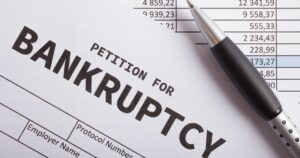Life happens. And while there are some things out of your control (even financially), there are also ways to drive yourself closer to the point where you need to file for bankruptcy. Have you made financial mistakes that lead to bankruptcy?
No one sets out in their adult years with the intention of filing for bankruptcy. Whether it is a lost job, unexpected illness, or some other financial hiccup, life may throw a curveball that leaves you thinking bankruptcy is the only option.
Each year in the United States, an estimated 800,000 Americans file for bankruptcy. Their reasons vary. And while some are unexpected, many of these cases could have been prevented to avoid bankruptcy. Many people make mistakes that lead to bankruptcy.
If you feel you are over your head and the debt is becoming too much, bankruptcy is a viable option. The federal government allows for consumers to file for Chapter 7 or Chapter 13, which helps them restructure debts, get out from under creditors, and have a fresh start.
When you find yourself considering bankruptcy, you may ask “how did I get here?” The answers might surprise you. Specific financial missteps that happen along the way can increase the chances that you will file bankruptcy in the future. By knowing what these mistakes are, you could potentially save yourself from getting further into debt and make your bankruptcy less burdensome if you do still need to file.
What Mistakes Do Consumers Make That Cause Bankruptcy?
Unfortunately, most adults set out into the world with little to no education on how to manage finances. It is no wonder many people make financial mistakes that lead to bankruptcy. When you do not know the dangers of credit cards, and those offers come in encouraging you to buy anything and everything on credit, you do not realize the errors of your ways until the damage is already done.
Credit cards, however, are not the only culprit. Other financial errors can increase your chances of bankruptcy later in life. Here are just some of the common mistakes consumers make that increase their opportunities for bankruptcy:
Taking on High Mortgage Debts
Who does not want to live in the house of their dreams?
While it might be a dream to own a big, beautiful home, how realistic is that payment? Mortgage companies might approve the loan, giving you the confidence you can afford that house. Most consumers forget about the actual costs of ownership – such as repairs, maintenance, utilities, insurance, and more. Before you know it, you are in over your head with ownership costs.
Do your best to purchase a home you can afford and be realistic about the overhead costs of that home. Do not just think of mortgage payments and insurance, but the incidentals that add up quickly each month.
Buying Cars above Your Means
Cars are expensive, and financing a vehicle can be very expensive. Also, cars depreciate. Therefore, the car you buy will be worth much less the moment you start using it. Eventually, you may owe more than the vehicle is worth – making it hard to trade in or sell if you find yourself unable to make the payment.
Consider a vehicle that holds its value well and try to purchase used over new. A used car depreciates slower than new. And with the right mileage and care, you can make that used vehicle last for years.
Neglecting Your Savings Account
How much do you save each month? Savings accounts are what you use when times get rough or those unexpected expenses show up (such as a medical emergency).
Try to save 10 to 20 percent of each paycheck every month. While it is tempting to spend the money, only use your reserve for emergencies. Eventually, you should save three to six months’ worth of expenses. That way, if you were to lose your job or become temporarily disabled, you have a security net.
Using Credit Cards
Credit cards are hard to resist. They seem like free money because your bank account balance stays the same, and you can buy almost anything. That purchase comes with the price of interest. And as interest accumulates each month, you spend more on that product than if you bought it outright.
If you cannot afford to buy it in cash, avoid buying it on credit.
Failing to Get Adequate Health Insurance
Health insurance premiums are expensive, especially if you have an entire household to insure. Yet, medical costs are on the rise. And if you pay out-of-pocket, you may find yourself in a financial black hole when a serious illness or emergency comes around.
Medical debt is one of the leading causes of bankruptcy in the United States, and most debtors do not have adequate health insurance to pay for their medical costs – thus, leading to further debt.
Review your health insurance policy. Don’t necessarily choose the lowest possible coverage unless you have the savings account to pay for out-of-pocket expenses like deductibles and copays.
Finding Yourself over Your Head in Debt? Speak with an Attorney
You have options when the debts become too much. Contact an attorney. Our team will review your financial status and see if we can find a more reasonable solution.
Sometimes, Chapter 7 is the only option when you make financial mistakes that lead to bankruptcy. But other times, you may be able to file under Chapter 13 – a repayment plan. Let our experienced attorneys help you find which bankruptcy options you qualify for, and discuss your rights so that you can make an informed decision that benefits your future.

